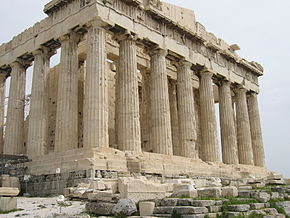Culture
![]()
This article is about human culture - for other meanings, see Culture (disambiguation).
In the broadest sense, culture refers to all manifestations of human existence that are based on certain values and learned behaviors, which in turn are expressed in the permanent production and preservation of values - as an opposite concept to nature, which is not created by man and has not changed. Important pioneers of this concept of culture include Arthur Schopenhauer, Harald Höffding and Joseph Petzoldt.
There are - depending on science, worldview or professional context - a variety of narrower definitions of culture.
Beyond academic discourse, the term culture in cultural policy is synonymously restricted to the "fine arts" (visual arts, music, literature).
In common language, the term often stands either for sophistication (manners, morality, living culture, eating culture, etc.) or in demarcation of the (assumed typical) modes of expression and behaviour - the cultural standards - of one's own ethnic group (e.g. Bavarians, Germans, Europeans) in comparison with so-called other cultures (such as Chinese, Latin Americans, indigenous peoples). Behind this usage, racist ideas can be hidden.
Cultures in the plural is used not only in public-political discourse, but also in ethnology, for archaeological cultures, and in comparative cultural social research to distinguish groups of people according to cultural characteristics. The term subcultures is often used for variants within a cultural group. In ethnology, the concept of distinguishable cultures is increasingly seen as problematic today due to its constructed character (defining boundaries where in reality there are fluid transitions).
In the course of history, the concept of culture has repeatedly been defined from different angles. Depending on the case, the term culture expresses the respective living self-image and zeitgeist of an era, the status or claim to power of certain social classes, or scientific and philosophical-anthropological views. The range of meanings is correspondingly wide and extends from a purely descriptive use ("the culture of that time") to a prescriptive (normative) one, if in the latter case the concept of culture is associated with demands to be fulfilled.
With regard to the protection of cultural property, there are a number of agreements and laws. UNESCO and its partner organisations coordinate international protection and local implementation.

The boundless cultural diversity of mankind is limited to certain groups in the plural term cultures. (Example: Muslim women in Brunei) .

Everything that humans have ever created is part of culture (Parthenon in Athens as a classical symbol for the building culture of antiquity)

The "fine arts": Expression of cultural creation (scene from the musical Kiss me, Kate)
Term Variety
Some examples of the different perspectives by which culture is defined:
- "Formative transformation of the given through the realization of ideas."
Focus on the products - the cultural achievements - which belong to very different cultural spheres (tool culture in technology, subsistence and economic methods, trade and transport; social culture in customs and traditions, social structures, education; symbol culture in language, writing, mythology and religion, science and philosophy, art and world view)
- "The supra-individual which determines the thoughts and actions of individuals"
Elevation of culture to the determining principle of all human development; the individual becomes the mere "vessel" of culture.
- "Order of human societies and life forms under a system of guidelines".
Focus on the values and social structures - the ideologies - as a prerequisite of all "origins" (for example, humanism, capitalism, communism, various forms of rule, Social Darwinism, Islamism, and many more).
- "Emergence of community cultural assets through the transformation of innate behaviors and motivations of individuals."
Focus on the culture of mind that follows from the motives for action (for example, from the urge to research to science, from fear and hope to religion, from daily interaction to morality and law, from wonder and reflection to philosophy from inspiration to art)
- "Evolution from primitive to increasingly complex forms of human expression and life."
Assumption of a "higher development" from the natural man to the cultural man, basis of the largely outdated evolutionism
Term History
Word origin
The word "culture" is the Germanization of the Latin word cultura ("cultivation, cultivation, cultivation, cultivation"), which is a derivative of Latin colere ("to cultivate, cultivate, cultivate, cultivate"). The terms colony and cult have the same origin. "Culture" has been attested in the German language since the end of the 17th century and here, from the beginning, denotes both land cultivation (agricultural cultivation) and the "cultivation of intellectual goods" (Geisteskultur, i.e. cultivation of language or a science). In the 19th century, the Nuremberg Industry and Culture Association also still used the word culture in the sense of "soil culture". Today, the agricultural reference of the term is only common in phrases such as cultured for arable land or cultivation for land reclamation; in biology, related meanings such as cell and bacterial cultures are also used. In the 20th century, culturally becomes common as an adjective, but with a distinctly intellectual emphasis.
The origin of the Latin word colere is derived from the Indo-Germanic root kuel- for "[to] turn, turn", so that the original meaning is probably to be sought in the sense of "to be busily engaged".
Ancient
Pliny the Elder did not yet coin the word "culture" for a concept, but he already distinguished between terrenus (belonging to the earth) and facticius (artificially produced). In Latin, the term cultura is applied both to the personal culture of individuals and to the culture of particular historical periods. Cicero, for example, characterizes philosophy as cultura animi, that is, as the cultivation of the mind. Thus, in addition to culture as material culture in Pliny, culture is also found as the cultivation of one's own personality.
Modern Times
Immanuel Kant's determination of man as a culture-creating being takes place in relation to nature. For Kant, man and culture are a final purpose of nature. Thereby, the moral capacity of man to the categorical imperative is connected with this final purpose of nature: "Act only according to that maxim by which you can at the same time will that it become a general law." To recognize such a general law as "the idea of morality still belongs to culture." It is this guiding principle of moral action which, on the one hand, separates man from nature; on the other hand, it stands as the ultimate end of nature in its service to respect and pursue this end. Without this moral guiding principle, man is only able to advance technologically, which leads to civilization.
The anthropologist Edward Tylor defined culture in 1871 ("Primitive Culture"), taking up Darwin's theory of evolution and thus giving the first definition oriented to the findings of natural science: "Culture or civilization in the broadest ethnographic sense is that epitome of knowledge, belief, art, morals, law, custom, and all other faculties and habits which man as a member of society has acquired."
According to Albert Schweitzer, culture ultimately strives for "the spiritual and moral perfection of the individual": "The struggle for existence is twofold. Man has to assert himself in nature and against nature, and likewise among men and against men. A lowering of the struggle for existence is achieved by the rule of reason spreading itself over nature as well as over human, stinking nature in the greatest possible and most expedient manner. Culture, then, is twofold in its essence. It is realized in the dominion of reason over the forces of nature, and in the dominion of reason over human sentiments."
The French cultural philosopher Claude Lévi-Strauss compared the concept of language with culture: culture behaves like language: only an outsider can recognize and interpret its underlying rules and structures.
Culture and civilization
→ Main article: Civilization#Culture vs. civilization
In the German-speaking world in particular, the distinction between culture and civilization has developed in the general understanding of the term, while in the English-speaking world, for example, only one word was used for "culture" (civilization) for a long time (compare the book title by Samuel P. Huntington Clash of Civilisations). It is only in the last few decades that culture has also been used more frequently, without, however, referring to a contrast to civilization.
The earliest formulation of this opposition in the German language was by Immanuel Kant:
"We are highly cultivated by art and science. We are civilized to the point of superciliousness, to all manner of social propriety and decency. But to consider ourselves already moralized is still very much lacking. For the idea of morality still belongs to culture; but the use of this idea, which amounts only to the moral-like in the love of honor and outward decency, constitutes only civilization."
For Kant, "civilization" therefore means that people educate themselves to live together in a mannerly way, acquire manners, and know how to arrange their daily lives in a comfortable and practical way, and that they perhaps produce vehicles, hospitals, and refrigerators through science and technology. All this, however, is still not enough for them to "have culture," although it might serve culture. For Kant, the condition for culture is the "idea of morality" (the categorical imperative), i.e. that people consciously direct their actions towards ends that are good in themselves.
Wilhelm von Humboldt follows on from this by relating the contrast to the exterior and interior of man: Education and development of the personality are moments of culture, while purely practical and technical things belong to the realm of civilization.
For Oswald Spengler, civilization has a negative connotation, namely when it denotes the inevitable dissolution stage of culture. Spengler saw cultures as living organisms that, in analogy to the development of the human individual, pass through a youth, a manhood, and an old age, and then perish. Civilization corresponds to the last of these stages, hence civilized man has no future culture. Civilizations "are a termination; they follow becoming as that which has become, life as death, development as rigidity [...] They are an end [sc. of culture], irrevocable, but they have been reached again and again with innermost necessity."
Helmuth Plessner even considers the German word "Kultur" almost untranslatable. In its "empathic" meaning he sees a religious function:
"Culture, the German epitome for intellectual activity and its yield in the worldly field, is a word that is difficult to translate. It does not coincide with civilization, with sophistication and education, or even with work. All these terms are too sober or too shallow, too formal, or 'Western' or tied to some other sphere. They lack the weightiness, the pregnant fullness, the soulful pathos that is associated with this word in the German consciousness of the nineteenth and twentieth centuries and makes its often empathetic use understandable."
Cultural nation and state nation
The concept of the cultural nation emerged in the 19th century as an expression of an understanding of the nation represented less by politics and military power than by cultural characteristics. The historian Friedrich Meinecke saw in the cultural commonalities that hold a nation together, in addition to common "cultural possessions" (e.g. the Weimar Classical period), above all religious commonalities.
Whereas a cultural nation was initially spoken of in a critical sense vis-à-vis the state nation, since the German sense of nationhood (consisting of language, traditions, culture and religion) was not reflected by political particularism, the concept changed under the influence of völkisch ideas: a "people" in the sense of a community of descent was now understood as the basis of a cultural nation. In the social sciences, the idea of a homogeneous national culture, by which peoples would be clearly distinguished from one another, is increasingly viewed critically, since it is used to exclude migrants and is not empirically verifiable.
Modern developments
Systems theory approach
For the systems theorist Niklas Luhmann, culture only begins, historically speaking, when a society succeeds not only in making observations of man and his environment, but also in developing forms and perspectives for observing the observations. Such a society is not only culturally and in terms of the division of labour differentiated to a high degree into experts, but has also developed second-level experts. These latter examine the modes of observation of the former and help to understand them in their contingency, i.e., only now are the contents of culture conceived as something made and not as an ability given to man. Culture thus becomes deconstructable and reconstructable.
"Historical Anthropology"
A current field of work, which could be called "historically oriented anthropology", examines the determinations of "human nature" that have been carried out in the course of history. For example, the order of the senses shows that their number cannot be clearly defined as five, that they appear partly hierarchically, partly on an equal footing. Thus the senses also have a history, namely when they are culturally coded. For example, a preference for the sense of sight over other senses, which is characteristic of Western culture, becomes apparent. Further fields of historical anthropology are:
- From the relationship between the spatially-material external world and the expansive inwardness of the human subject, a history of the soul and feelings emerges. It is precisely in this context that views can develop which conceive of feelings not as inner states of the individual, but as spatially extended atmospheres.
- The historical relationship between "health" and "diseases" allows us to examine how what is considered healthy and what is considered pathological is constantly shifting, without a fixed boundary being discernible here. Rather, here too every definition is culturally dependent, which is particularly evident in the case of mental illnesses, as evidenced, for example, by the changeably indeterminate use of the terms "nervousness", "hysteria" and "hypochondria" in the period from the 18th to the 20th century.
- The relationship between the sexes is now being studied in a variety of scientific disciplines, with particular attention being paid to gender studies. The distinction between biological sex and gender, which originated in the Anglo-Saxon world, has also become established in the German-speaking world. Judith Butler in particular has pointed out that biological sex is subject to cultural interpretation and that "typically male" or "typically female" characteristics are therefore not definable: Gender roles as well as "gender" are constructed.
Variants and limits of the concept of culture
Jürgen Bolten, a German scholar and professor of intercultural business communication, differentiates between four clearly distinguishable groups of compounds with the root word kult- in terms of their meaning. He subsumes two of them under a broad concept of culture: (1.) culture as a living world or ethnicity, in the sense of inhabiting or being resident; (2.) culture as biological cultures, in the sense of cultivating, farming. Two others he subsumes under a narrow concept of culture: (3.) culture as "high" culture, in the sense of: cultivating, adorning, worshipping; and (4.) culture as cult or cultus, in the sense of: worshipping, adoring, celebrating. Bolten traces the narrow concept of culture back to the separation of culture and civilization, which was advocated above all by Immanuel Kant and later by Oswald Spengler (see also the section on "Culture and Civilization").
Other authors refer to Cicero, Herder, von Humboldt with regard to the development of the concept of culture in the German-speaking world.
In view of the multitude of different uses of the word "culture" and the variety of competing scientific definitions, it seems to make sense to speak of many cultural concepts instead of one. As early as 1952, 170 different definitions of the term were counted. In a sense, culture is a variable that depends on the various frameworks of different disciplines and their points of view. The cultural philosopher Egon Friedell put forward the following provocative thesis:
"Culture is wealth of problems"
- Egon Friedell
Contrasting culture and nature
→ Main article: "Nature and culture": Leading category(ies) with conflict potential
The concept that makes the emergence of culture comprehensible and clearly delimits the term contrasts culture with nature. Culture is thus defined as everything that man changes and produces of his own accord, while the concept of nature encompasses that which is by itself as it is.
However, "nature" can only ever mean something that has been described by cultural techniques such as art and science. At the same time, the boundaries of what "nature" denotes are increasingly extended by human research: the electron microscope, for example, makes the smallest particles visible, while the Hubble telescope brings the great cosmic scales to view. However, if nature can only be perceived through cultural technology, it ultimately seems that "everything is culture." This makes the idea that culture is always engagement with the other, the new and the foreign, increasingly implausible, because if everything is culture, then it is unclear what is meant by the term at all.
If culture is nevertheless to continue to be understood as the mastering of the Other, of nature, then nature must not be thought of as spatially opposed to man, but rather the Other is inscribed in culture itself. The Other does not simply exist alongside or outside culture, but adheres to it like a reverse side. "Nature" would then be a boundary term that encompasses "something" that is described and worked on by man, but which at the same time means that this "something" never becomes directly accessible. Thus there is no "nature in itself", but only descriptions of nature. Exact mathematical physics is only one possible form of representing nature, although the mathematical description of nature is able to gradually approach the essence of "nature" within its given logic. Ernst Cassirer described this changed conception of nature as a transition from substance to function in his treatise Substanzbegriff und Funktionsbegriff in 1910.
Cultures: The Pluralization of the Concept of Culture
The plural cultures is used in general language usage as a collective term for groups of people who are perceived as distinguishable from one another due to different cultural characteristics of the majority of their members. These can be peoples or ethnic groups, but also occupational groups, company workforces, associations and the like. In contrast to the terms peoples or ethnic groups (which are often used synonymously), in which the self-attribution is always considered in specialist discourse, the idea of cultures is usually based only on the attribution of others. The lack of opinion of the people so designated (emic perspective) results in one-sided, distorted or false perceptions. In addition, the term can also acquire racially motivated secondary meanings. Nevertheless, in the public-political debate, in contrast to the sciences, there is no critical examination of the term cultures.
The pluralization of the term (if not anticipated by everyday usage) goes back to the ethnologist Franz Boas, who saw culture primarily as the result of a historical development. But since every "people" has its own history, it must also have its own culture, Boas concluded (cf. cultural relativism). With this approach, he distanced himself from the racial theories that attribute differences in human being to innate characteristics and abilities.
The concept was adopted by the other social sciences and by archaeology (whose basis is necessarily only the artefacts of cultural creation and their stylistic and functional differences). In ethnology, the pluralistic concept enjoyed great popularity until the middle of the 20th century: sharp boundaries were drawn between different cultures (up to continental cultural areas), which often coincided with geographical, political or linguistic boundaries.
Since the 1970s at the latest, ethnologists have recognized that the boundaries between cultures were constructed rather than real, and that they were often associated with evaluations. Transitions that actually flowed were thus perceived as opposites. This view was well received by the public and politicians. Particularly in times of mass migration, cultural otherness was thus emphasized and assigned boundaries that were difficult to overcome, while the much greater commonalities received little attention. Ethnologists have therefore again largely distanced themselves from the concept of culture(s), while the political concept continues to be used uncritically and emphasizes the foreign.
"There are undoubtedly cultural boundaries; but they are not such that they uniquely identify groups of people and that we can speak of these groups as "cultures.""
- Faculty of Social Sciences, University of Vienna
The concept of culture outside Western thought
In principle, the juxtaposition of nature and culture is a typically European pattern of order. Ethnology has shown that there is no conception of the world that is understood in the same way by all people. The dichotomy of nature ↔ culture, which is taken for granted in the "modern world", does not exist among all peoples. Amazon Indians, for example, also consider animals, plants, natural phenomena and nature spirits to be human beings. According to their conception, they exist temporarily in a different form, but are also fully-fledged "cultural beings".
Normative use of the term
Various questions are raised when the term "culture" is used not only descriptively (descriptive), but also normatively (prescriptive). In this sense, "culture" means not only what is actually found, but also what is supposed to be, for example, non-violence.
A normative use of the concept of culture is not unusual in everyday language, as can be heard, for example, from the fact that a "culture of violence" is spoken of only pejoratively, if at all - such a culture would be an "unculture". Moral standards are thus frequently associated with the concept of culture. However, the difficulty arises in determining what, for example, can be understood by "violence" and when it is avoidable. Not only do different cultures have different views on when an action is violent, but also on what is violated by violence in the first place.
The concept of culture in biology
No matter how much an organism adapts to its environment: Genetic inheritance of properties acquired individually through learning or physical adaptation is considered impossible, since the innate properties laid down in the genome - apart from a few epigenetic factors, whose range of influence is, however, genomically limited - are not changed by this. However, non-genetic (cultural) inheritance is possible in principle. For example, by an animal passing on individually acquired traits and information, or traits and information acquired from others through social learning, to others (e.g. its own offspring). "The transmission of information from one generation to the next by non-genetic means is generally referred to as cultural tradition." In behavioral biology, such cultural traditions are often referred to as culture.
Cultural traditions exist, for example, in many (but not all) bird species in which the young learn the species-typical song from the parents by non-genetic means (vocal imitation). Tool use in animals also often-but not always-fits the definition of cultural tradition. The most far-reaching examples are found in the great apes as well as the ravens and crows, since these species are not limited to single tools - i.e. they can even develop several traditions within one species.
See also: Social behaviour from the point of view of behavioural biology

The Hubble Telescope
.jpg)
The opposition of "culture" and "civilization" goes back to Kant

The concept of culture goes back to the agricultural reclamation - the cultivation - of nature.
.jpg)
ESA control room as an example of modern contemporary scientific culture
Questions and Answers
Q: What is culture?
A: Culture is a word for the 'way of life' of groups of people, meaning the way they do things. It includes writing, religion, music, clothes, cooking and other activities that are passed on to the next generation by learning rather than genetics.
Q: How is culture passed on?
A: Culture is typically passed on to the next generation through learning rather than genetics.
Q: What are some common uses for the word "culture"?
A: The word 'culture' is most commonly used in three ways; excellence of taste in the fine arts and humanities (also known as high culture), an integrated pattern of human knowledge, belief and behavior; and outlooks, attitudes, values, morals goals and customs shared by a society.
Q: What discipline investigates cultures?
A: The discipline which investigates cultures is called anthropology though many other disciplines play a part.
Q: How does culture differ from genetics?
A: Culture is passed on to the next generation by learning whereas genetics are passed on by heredity. Additionally, culture includes all human phenomena which are not purely results of human genetics while genetics refer specifically to inherited traits from one's parents or ancestors.
Q: What does high culture mean?
A: High culture refers to excellence in taste in fine arts and humanities such as literature or art.
Search within the encyclopedia